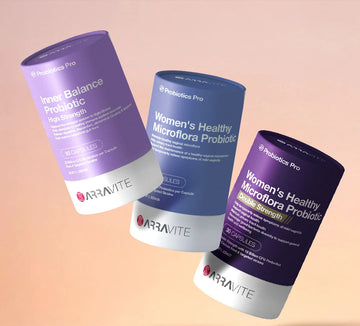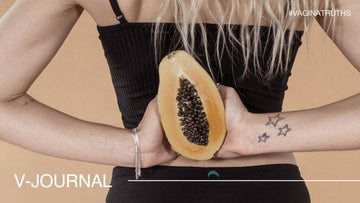|
We know it sounds a bit ‘sciency’, but having a good understanding of what your vaginal pH is and how it works can help you avoid some nasty infections.
So, let’s get started.
What is vaginal pH?
Vaginal pH, which stands for ‘potential of hydrogen, refers to a scale of how acidic or alkaline your vagina is. pH ranges from 0 to 14, with anything below 7 considered acidic, and anything above 7 alkaline. A healthy vagina sits around the 3.8 to 4.5 mark, so it’s on the acidic side. Believe it or not, pickles and wine both sit around the same pH level.. The pH scale helps us determine whether a vagina is healthy. A healthy vagina from age 15 to around 50 sits at or below 4.5. However, what’s considered a healthy level changes with age, and your vagina’s pH tends to increase closer to 5 as you get older.
What causes a vaginal pH imbalance during sex?
Unprotected sex can cause an imbalance in your vaginal pH levels for several reasons. Semen has a high alkaline level, which sits between 7.1 and 8. During sex, your vagina increases its alkalinity to protect the sperm and encourage fertilisation. So while this may seem wonderful if you’re trying to conceive, it also can initiate the growth of certain bacteria (the one you don’t want). So if you’ve ever heard the advice, “pee after sex!”, this is why. Due to the growth of bad bacteria, you become more vulnerable to infection, like a urinary tract infection (UTI.) So, to avoid this, it’s recommended that you pee before and after sex to flush away any bacteria that could find their way into your urethra during sex. So while an excuse to drink excessive amounts of cranberry juice is always nice, if you’ve had a UTI before, you’ll know that not even cranberry juice-infused cosmopolitans will ease the pain of it. Certain lubricants you might use during sex could also be the culprit for your vaginal pH imbalance. If they have a pH level higher than 4.5, then it's easy for your vagina to be thrown off balance. Other factors, such as using harsh chemicals or fragranced soaps, or even just being on your period, can cause your vagina’s pH to be out of whack. Period blood has a pH of 7.4, therefore it's normal for the alkalinity of your vagina to increase during and after your period.
Vaginal pH imbalance symptoms
Luckily, it’s pretty easy to tell when your vagina’s pH level is a bit funky. Being aware of changes can help you quickly take action before a potential infection arises. The most common signs of a vaginal pH imbalance are a fishy smell, burning sensation during sex or urination, unusual discharge and an itchy vagina.
How to balance vaginal pH naturally and still enjoy sex
There are a number of ways you can maintain a healthy vaginal pH. Some might say, a happy vagina, a happy life! And it’s true. If you can look after your vaginal health, you're doing yourself a great favour. Improved fertility, better sex life, fewer infections and better general wellbeing…just to name a few of the benefits of a healthy vagina.
1. Use a condom during sex
Using protection during sex is great for you, your vagina and your sexual partner. Unprotected sex doesn’t only mean you’re at higher risk of contracting or spreading a sexually transmitted infection, but it also puts you at risk of developing a vaginal infection. Due to the high pH level of semen, unprotected sex can disrupt your vaginal pH level.
2. Avoid harsh chemicals and fragrances
Use gentle and fragrance-free soaps or body washes. Certain chemicals or ingredients can upset the pH balance of your vagina by killing the good bacteria and allowing the bad ones to thrive.
3. Don’t douche
Douching is the absolute worst. Douching can cause harmful bacteria to thrive, and disrupt your vaginal pH level, making it very easy to form an infection. Try not to over wash your vagina in general, as your vagina naturally self-cleans! Only wash the outside area once a day, using water.
4. Increase probiotic intake
Probiotics are a great way to restore the healthy bacteria within your body. Whether you increase this through foods high in probiotics, such as yoghurt, sauerkraut or kefir, or take it as a supplement, probiotics will help you maintain a healthy vagina. If you’re taking antibiotics or have recently finished a course, probiotics can help you restore the good bacteria that was killed off. Be mindful that you should always consult with a medical professional when introducing a new supplement, especially if in conjunction with medication.
|
Balance your vaginal pH today
Vaginal health may feel like a taboo topic, but Arravite is proactively fighting the stigma to make women’s health a part of everyday conversation. It’s normal to experience an imbalance in your vaginal pH level every now and then, but taking control of your vaginal health, whether it be through lifestyle changes, preventative actions, or introducing probiotics to your diet, are all easy ways you can make a difference. Fewer infections will mean less of a need to be on regular medications or consistent cycles of antibiotics, keeping your vagina happy and healthy! If you’re curious about taking probiotics to support your vaginal health, check out Probiotics Pro.

Disclaimer Always read the label. Follow the directions for use. If symptoms persist, talk to your health professional. Supplements may only be of assistance if dietary intake is inadequate. Do not use if cap seal is broken. |
The Arravite Content Hub






